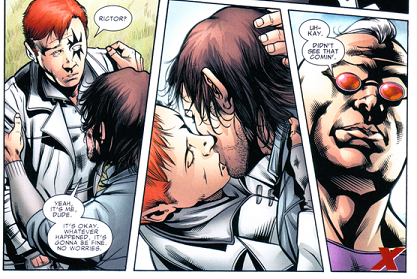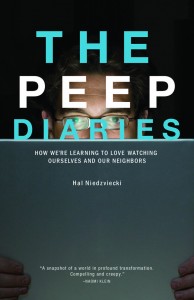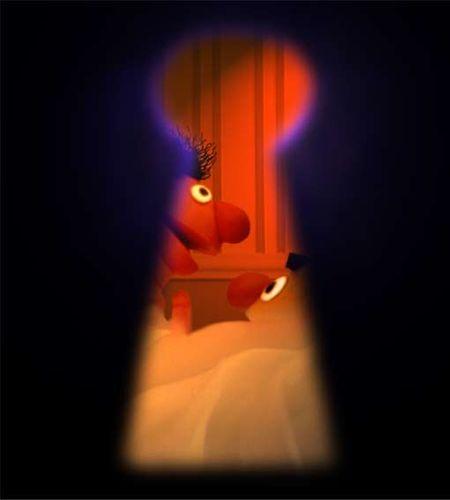There’s comic books, a confession or two and an actual Roundup special guest today in the final portion of my week-long post-Pride discussion, but first a little tribute to the delightful Mollie Sugden. For 13 years, she tirelessly delivered one of TV’s greatest running gags as the cat-fancying Mrs. Slocombe on “Are You Being Served?”
With John Inman as the ‘is-he-or-isn’t-he’ Mr. Humphries by her side, the 1972 BBC sitcom was a masterpiece of silly sexual innuendo, slying playing with gay themes at a time when people were only just starting to come out.
But innuendo gets old after a while — even in comic book form. Fans of the various “X-Men” books in the ’90s noticed that heroes Rictor and Shatterstar had a very tight friendship, and were teased for years with hints of perhaps more between the two. Last week, “X-Factor” writer Peter David finally ended(?) this game by reuniting the duo in style:

There was a time when gay men and lesbians delighted in any hint of seeing ourselves reflected in pop culture but those days are long over. Whether it’s sitcoms, comic books or movies, we want our full lives represented, we demand to be seen.
But what about in real life? Two anecdotes:
At the Xtra anniversary party two weeks ago in Toronto, I witnessed a cute shirtless guy proudly leading another cute shirtless guy toward the exit. He passed by someone we both know who smirked and yelled, “Slut!” Without turning around, the first guy announced, “Hey, at least I’m honest about it!” He’s right, and I think Marcus McCann, who I quoted at length yesterday, would’ve been proud.
Last Friday, I was out walking the dogs when I ran into a guy I’d had a fling with. He invited me for another round but I told him that my boyfriend and I are “pretty monogamous these days.” He told me where he’d be if I changed my mind and then whispered in my ear, “Discretion is assured.”
Oh no. Does that line work? I like brazen sluttiness but that word “discretion” made me cringe — didn’t we come out of the closet to get away from all that?
As I said yesterday, with gay people racing towards marriage as fast as straight people are racing from it, I’m intrigued by the couples I know — gay and straight — who aren’t monogamous and relatively open about it. Is it naive to think that all people could be that honest about their sex lives?

Maybe not, says Hal Niedzviecki, culture commentator and author of the new book “The Peep Diaries: How We’re Learning to Love Watching Ourselves and Our Neighbors.” What he calls “peep culture” is the internet-driven trend towards voyeurism and exhibitionism on a widespread scale — our complete lives on Facebook, for starters. “Peep culture crosses all social demographic lines,” Niedzviecki says.
Past books like “The End of Privacy” tried to warn us of the growth of citizen surveillance but “they got it wrong,” he says, “It’s not being taken from us. We’re trading away our privacy for whatever we hope to gain — attention, money or, yes, acceptance.” Quoting the famous protest line, “We’re here, we’re queer, get used to it,” Niedzviecki notes that “gay people have definitely benefited from peep culture.”
Besides the fact that gay men have become better represented in reality TV shows than we ever did in scripted television, MySpace alone shows that “gay men are just as boring — or as strange — as anybody else,” he says. “You have to work a lot harder to get noticed now.”
And it’s harder for right-wingers to scream about morality, Niedzviecki says, “when you can see how many other people are doing the same thing.” This seems like an extension of Alfred Kinsey‘s sex surveys in the 1940s — gay people who felt utterly alone were suddenly told that up to 10 percent of the population were just the same — only now you can refine it right down to particular fetishes, if need be.
One might argue, then, that Pride parades are a celebration of peep culture — a perfect, spectacular union of the voyeur and the exhibitionist. I love Pride day because of the incredible humanity at its core — the paradox of people at their most naked (and not just literally). The more outlandish the outfit, the more you can see the deep enthusiasm, joy, power and soul of the person within.
But, like people say around Christmas, how do you keep that spirit going all year? In the opinion piece that sparked this week’s chatter, activist Peter Tatchell wrote that the early gay movement fought for bigger prizes: “Instead of pleas for tolerance, the demand was unconditional acceptance.”
Is the answer to that acceptance full transparency — a culture where everybody knows your business and you’re happy to let them? I’d be delighted to hear what you think. Me, I’m willing to risk it — the gay community was built on people standing up, coming out and being honest about our lives.
In his book, Niedzviecki calls peep culture “sudden, unexpected, electric eruptions of transparency.” I guess that’ll do for now, even if the eruptions can look really silly:

What? You didn’t think I’d end on a serious note, did you? Thanks to Hal for enabling me and the rest of you who’ve chimed in with your thoughts this week. Monday, it’s back to YouTubes, fratboys and wisecracks — have a great weekend!

 Why you can trust Xtra
Why you can trust Xtra


